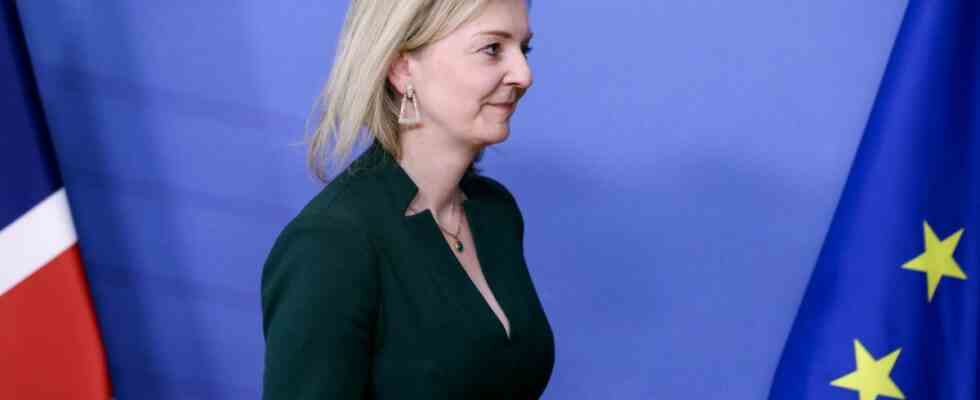When Liz Truss was asked a week ago whether she considered French President Emmanuel Macron a “friend or foe,” she replied: “The jury is still out,” which means something like: That’s not decided yet .
It remains to be seen whether Truss will maintain this rather unfriendly tone towards France and other European countries as prime minister. In any case, in Paris, Brussels and Berlin, people are prepared for the fact that, after Theresa May and Boris Johnson, another Tory boss will move into 10 Downing Street who defines herself as being as tough as possible on the EU.
There are two main reasons why Truss should not deviate from this. First, in the race to succeed Johnson, she was the Brexiteers’ nominee. Unlike her opponent Rishi Sunak, Truss has managed to secure the support of EU opponents, not only within her party but also in the influential conservative media. Truss was able to do this because, as Foreign Minister, she has already shown that she is quite capable of defying Brussels.
And that is the second reason why the relationship between the EU and Great Britain should not relax so quickly: Truss must continue to be tough on the EU, otherwise it would lose its credibility. That’s not just how their supporters in London see it, it’s also how they see it in Brussels, Paris and Berlin. In the case of Truss, the question of credibility is even more important than in the case of Johnson, says an EU diplomat, after all she voted in the Brexit referendum for Britain to remain in the EU. She now has to show all the more that she is serious about Brexit.
Truss complains about “Brussels bureaucrats”
So far there is no doubt about that. As Foreign Minister, Truss was most recently responsible for negotiations with the EU. If you ask Brussels officials how it was with her, the answer is usually eye rolls. Truss is friendlier and more committed than her predecessor, former Brexit Minister David Frost, but the initial good feeling at the negotiating table quickly disappeared when Truss was back home in London. Then she just told the Brexit-enthusiastic newspapers how terribly inflexible the “Brussels bureaucrats” were.
Well, from the EU’s point of view, the future relationship with Great Britain will be decided primarily on one issue: Northern Ireland. Brussels is only ready to resume serious negotiations if Truss takes her “loaded pistol” off the table. That’s what EU diplomats call the law with which London could undermine parts of the Brexit treaty. In Brussels they hope that Truss will stop the project, but so far there are no signs of this. But on the contrary. In any case, there would be enough time, because it will probably be several months before the legislative process is completed.
The core of the dispute between Brussels and London is about the so-called Northern Ireland Protocol. It is part of the withdrawal agreement that the British government signed with the European Union after the Brexit vote. The primary goal was to prevent goods controls at the barely perceptible border between the Republic of Ireland and British Northern Ireland so as not to burden the peace process.
London and Brussels therefore agreed that the former troubled province would continue to comply with EU product and customs regulations despite Brexit. And so, in principle, EU tariffs are due on products from England, Scotland and Wales that are at risk of being transported from Northern Ireland to Ireland, i.e. into the EU internal market. The controversial regulation has meant that British steel manufacturers now have to pay 25 percent duty on certain deliveries from Great Britain to Northern Ireland.
It’s all about the Northern Ireland Protocol
From the point of view of the Brexiteers, the status quo is unsustainable, after all the province is no longer an equal part of the United Kingdom. The fact that Johnson agreed to this arrangement plays a subordinate role for her. Only one thing is important to Brexit advocates: something has to change. You sometimes see it that way in Brussels, the only question is: what exactly?
It is unlikely that the dispute with a Prime Minister Truss can be resolved quickly. On the other hand: When people hold certain offices, some things sometimes change quite unexpectedly. In any case, the EU side hopes that Truss will not immediately rekindle the Brexit dispute. There is already speculation that it could trigger Article 16 of the Northern Ireland Protocol in September. Anyone who invokes this can immediately override parts of the protocol.
Whatever the new prime minister decides, the EU is preparing for the fact that the Tories, even under Truss, will be guided more by ideology than by pragmatism.

